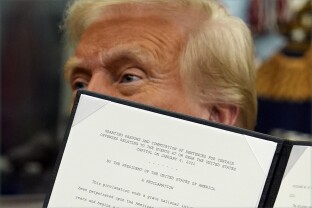President Donald Trump’s Jan. 6 pardons were so broad and vaguely written that they could open unexpected legal arguments in unexpected cases.
The president’s pardon proclamation on Monday applied “to all other individuals convicted of offenses related to events that occurred at or near the United States Capitol on January 6, 2021,” and came alongside a directive to the attorney general to dismiss “pending indictments” against anyone for “conduct related to the events at or near” the Capitol that day.
The “at or near” raised some questions: How far from the Capitol could an offense take place and still make the cut? Could the directive apply to the still at-large suspect who placed pipe bombs at the Republican National Committee and Democratic National Committee that day — or to the Capitol Police officer who killed rioter Ashli Babbitt, who some on the right are publicly pleading with Trump’s Department of Justice to prosecute? And could a creative attorney argue their client’s non-riot offense applied?
Legal experts and former prosecutors told NOTUS that the blanket pardon probably wouldn’t apply to individuals who just happened to be around the Capitol committing non-insurrection-related crimes that day. But experts agreed that choosing not to list individual names was unusual. Some said it suggested sloppiness by an administration eager to put Jan. 6 in the past.
“The Department of Justice could make a strong argument that in context this is not what the president meant,” said Eric Columbus, a lawyer who worked with the House select committee on Jan. 6. “But I mean, normally a good lawyer would, you know, dot the i’s and cross the t’s a bit more carefully.”
Trump’s sweeping clemency order applied to more than 1,500 people. The government has the names of all of the Jan. 6 riot defendants, but they are not named in the order.
That language could give the U.S. attorney general some leverage to decide who is covered under Trump’s blanket pardon, said Daniel Richman, a former federal prosecutor in the U.S. Attorney’s Office for the Southern District of New York.
For example, Richman said, if the person who planted a pipe bomb outside the DNC and RNC is ever apprehended and claims to be considered under the pardon, they would have to make their case to the attorney general.
“No one can walk into court with this proclamation and say that, ‘I’m covered by the terms of the proclamation,’” Richman said. “The proclamation says, the attorney general shall administer and issue the certificate. So unless someone has a certificate, the odds are that they can’t get the benefit of it.”
However, legal experts who spoke to NOTUS were mixed in their interpretation that the attorney general would have much discretion over the pardons. Jonathan Entin, a law professor at Case Western Reserve University, told NOTUS, “I don’t think” the attorney general will have much personal say over the pardons. He added that it’s likely that Trump’s attorney general would issue a certificate to anyone Trump felt deserved it.
“I’m not sure that the way this is written gives the attorney general all that much discretion,” Entin said. But to the extent the AG does have discretion, it’ll be someone with Trump’s blessing. “Pam Bondi isn’t in office yet because she hasn’t been confirmed. But there is an acting attorney general, and that was someone whom the administration selected presumably out of a sense that this person is gonna be reliable.”
While the language may be vague, legal experts say that anyone found to have committed a crime outside of the insurrection is going to have a tough time explaining to a judge that they should be pardoned.
“As a whole document, you can’t read one clause without the other … somebody could try,” said John E. Jones III, president of Dickinson College and a former federal judge. “I mean, good luck. They’re going to have to convince a judge to interpret that as pardoning them of the offense. They’re just not going to be successful.”
So why did the White House make the language so broad rather than listing convicted individuals who were now pardoned in the proclamation?
The White House did not respond to a request for comment. But experts said it was probably for simplicity’s sake.
“It was for the purpose of ending any further attention to this episode and going forward with it in the rearview mirror,” said Paul Larkin, a legal expert at The Heritage Foundation. Larkin mentioned President Gerald Ford’s pardon of President Richard Nixon as a similar incident of a presidential pardon being used to put an incident in the past.
Presidents have issued broad pardons before, dating back to George Washington’s pardons for participants in the Whiskey Rebellion. But whether Trump’s pardons will be remembered centuries from now like those is debatable.
“It becomes a matter of opinion whether this is really different from those,” Richman said. “And certainly those like me that treat the assault on the Capitol as a particularly vicious and dangerous occurrence. I think this is different from just people who are caught up in the moment in the 1790s [Whiskey Rebellion] or resisted the draft.”
Columbus had another theory for why Trump’s pardons were so sweeping.
“He loves anyone who did anything in support of his efforts to overturn the 2020 election, and they’re heroes to him, and he wanted to do the most he could do,” Columbus said.
—
Helen Huiskes and Torrence Banks are NOTUS reporters and Allbritton Journalism Institute fellows.
Sign in
Log into your free account with your email. Don’t have one?
Check your email for a one-time code.
We sent a 4-digit code to . Enter the pin to confirm your account.
New code will be available in 1:00
Let’s try this again.
We encountered an error with the passcode sent to . Please reenter your email.


